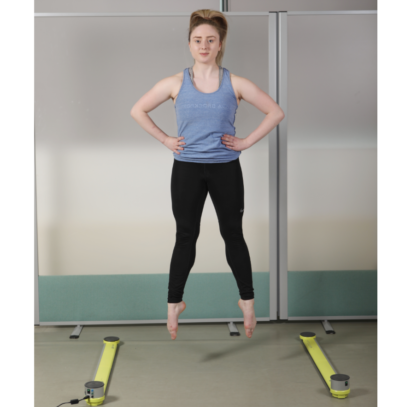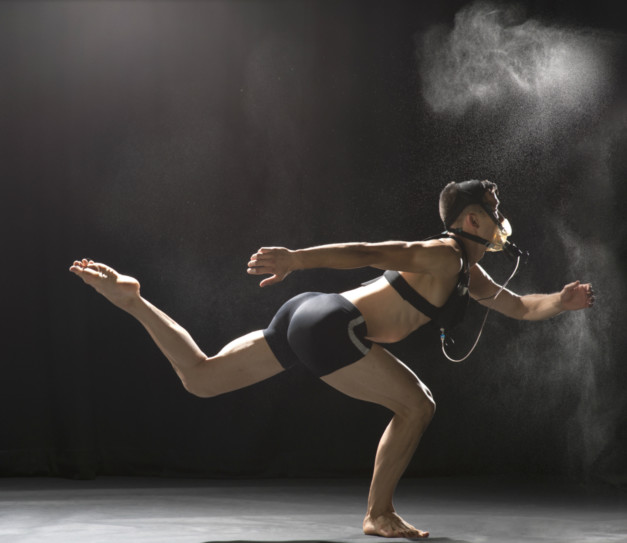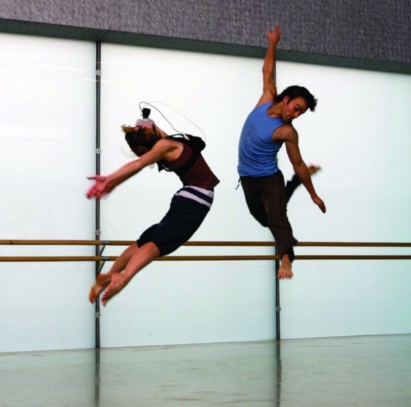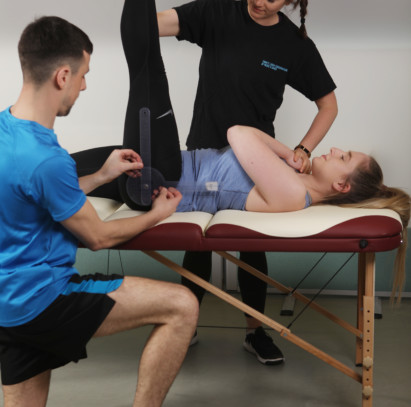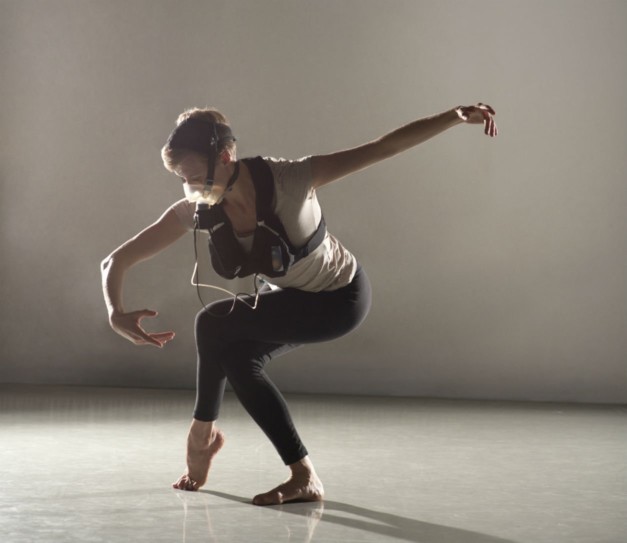Introduction
Trinity Laban is an established pioneer in the rapidly expanding field of Dance Science, having offered the world’s first Masters degree in Dance Science in 2001. Building on this foundation, we now offer an exciting BSc programme.
The BSc in Dance Science will enable students to build on their passion for dance by enhancing and improving their dance technique and creative skills whilst also developing a sophisticated level of knowledge and understanding of how the body works, how movement is learned and how to support themselves as dancers or others participating in dance.
Situated within the dynamic artistic community of a conservatoire, students will study areas such as biomechanics, exercise physiology, performance psychology, fitness and wellbeing. The course is taught by leading research-active academics and practitioners and will equip graduates with the skills and knowledge to be able to work in a range of roles within dance and within the health and fitness industries, or to progress to further study.
Programme Details
The Programme is undertaken over three consecutive academic years on a full-time basis. Advancing through the programme, students will be increasingly encouraged to develop as independent learners.
Year 1
The focus is on developing knowledge of key areas of Anatomy, Physiology, Nutrition and Motor Skill Learning. Alongside this, students will acquire fundamental research skills including finding and interpreting sources critically and gaining knowledge of the main principles of research and research methods.
Modules (120 credits):
- Technical Practice I (30 credits, 30 weeks)
- Functional Anatomy & Physiology (20 credits, 30 weeks)
- Nutrition (20 credits, 15 weeks)
- Motor Skill Learning (20 credits, 30 weeks)
- Researching Dance Science I (30 credits, 15 weeks)
Year 2
The focus is on consolidating and extending the material covered in Year 1 while introducing Performance Psychology and acquainting students with a range of methodologies for analysing movement and dance. Students will develop critical, creative and communication skills as well as foster a broader understanding of research methods. They will begin to apply their knowledge and understanding in different contexts and deepen their own embodied understanding of the material introduced through technical practice.
Modules (120 credits):
- Technical Practice II (30 credits, 30 weeks)
- Analysis of Performance (40 credits, 30 weeks)
- Performance Psychology (20 credits, 15 weeks)
- Researching Dance Science II (30 credits, 15 weeks)
Year 3
The focus will be on the application of the theoretical areas of Dance Science gained in Years 1 and 2 to different contexts and populations. Students will develop the ability to evaluate critically the outcome of their decisions and develop the capacity to plan, undertake and write-up an independent research study.
Modules (120 credits):
- Technical Practice III (20 credits, 30 weeks)
- Training Strategies for Dance, Fitness and Health (20 credits, 15 weeks)
- Creative Arts & Health (20 credits, 15 weeks)
- Project Dissertation (60 credits – supervisory tutorials)
Throughout the three years, students will engage in Technical Practice to apply theories and concepts learned in the other modules to develop their own dance skills and to deepen their understanding of Dance Science through practical and embodied learning.
For further information, see the Programme Specification
Teaching and Learning
Hours
The overall number of student learning hours is approximately 3636.25, comprising taught, placement and self-directed study hours. The approximate number of contact hours on the programme is 1106.5 hrs
How will I learn?
Learning will take place through a blend of formal tuition, experiential learning and guided self-determined study in classes, workshops, small-groups, guided independent study and tutorials. Learning and teaching methods support the acquisition of knowledge and skills, alongside critical thinking and reflective evaluation. Collaborative learning and practice is a central tenet of Trinity Laban’s mission.
Curricular Intergration
On the BSc programme there will be an integrated approach to the curriculum, ‘topics of study’ will be phased through and across modules to ensure clear that the links between different areas of study are clear. This will particularly be the case for the Technical Practice module across the three years.
Guided self-determined activity
Students will be supported to move from guided learning to greater autonomy through their studies, using individual practice (for example, self-directed learning in the Dance Science Lab and Body Conditioning Studio), and independent research for Project development.
Technical Practice
Throughout all three years of study on the BSc Dance Science programme students will engage in daily technical and physical practice, which continue through until the Summer term in July. These include:
- Technique classes
- Somatic practice
- Dance Science informed practical sessions
- Access to on-site free conditioning studio classes: Yoga, Pilates (Dynamic Pilates + Equipment Pilates), Strength and Conditioning, HIIT (High Intensity Interval Training), Meditation and Self-practice gym sessions.
Technique classes will encompass a range of dance genres with some classes including the accompaniment of live music.
Recognised Industry Awards
You will have the opportunity to take the following recognised industry awards during the programme.
- Level 2 Exercise to Music: Register of Exercise Professionals (REPs)
- Safe in Dance International (SiDI) Healthy Dancer Certificate (HDC)
- Sport First Aid Certificate
Opportunities
- Gain recognised industry awards (Level 2 Exercise to Music: Register of Exercise Professionals (REPs), Safe in Dance International (SiDI) Healthy Dancer Certificate (HDC), Sport First Aid Certificate)
- Conduct research with conservatoire trained dancers
- Physical development: Access to on-site self-practice gym sessions and a range of conditioning studio classes
- Continue to build upon your dance skills by experiencing conservatoire dance training
- Assist with screening
- Be involved with departmental research
- Network with our partners (IADMS – International Association for Dance Medicine and Science, NIDMS – National Institute for Dance Medicine and Science)
Facilities
Students on the BSc Dance Science programme will benefit from Trinity Laban’s purpose-built facilities including world-class dance studios, the lecture theatre, seminar rooms, our Dance Science Laboratory, Body Conditioning Studio and the Laban Library.
Dance Science Laboratory
The on-site fully operational Dance Science Laboratory is focused on optimising performance of dancers through the testing and analysis of the complexities of dance using state-of-the-art technologies. Students will have access to the Dance Science Laboratory with technical support staff and the latest physiology and biomechanics testing equipment. They will have opportunities to use the equipment throughout their three years to support their learning.
Body Conditioning Studio
Trinity Laban Health and the Body Conditioning Studio together provide an onsite centre where students can access qualified practitioners in a range of therapies in support of their training. These include: physiotherapy, sports massage, craniosacral therapy, acupuncture and acupressure massage. The Body Conditioning Studio offers free classes aimed at supporting the health and wellbeing of all students. Classes available include: Pilates (Dynamic Pilates + Equipment Pilates), yoga, Strength and Conditioning, HIIT (High Intensity Interval Training), meditation and self-practice gym sessions.
Laban Library
The Laban Library and Archive is the UK’s largest and most varied open access specialist research collection on dance and related subjects in physical and electronic form. Topics available include: Dance Science, Psychology, Sports Science, Biomechanics, Physiology and Somatic texts and journal as well as literature covering ballet, contemporary dance, choreography, dance health, dance teaching. We also have a growing collection of contextual material from subject areas such as fine arts, education and philosophy.
How will I be assessed?
- practical demonstrations
- open-ended tests
- structured tasks
- written reports
- reflective journals
- oral presentations
- dissertation
Assessment tasks are phased and a schedule of submission or presentation dates will be published at the beginning of each year.
Entry Requirements
- A minimum of 112 UCAS tariff points.
- An interest in Dance Science, normally demonstrated by an A-Level or equivalent in Maths, Science, Physical Education or Psychology (but not essentially so).
- Applicants without the recommended academic subjects at A-level are encouraged to apply if they have any of these subjects at GCSE (9-4).
- All applicants will be interviewed and will be asked to complete a dance science task to assess their aptitude for the programme.
- Some prior dance experience is essential and will be assessed through your personal statement.
Applicants will normally have studied a minimum of two years post GCSE. However, mature individuals with professional experience may also apply.
In addition, we accept a wide range of national and international qualifications using equivalencies from UCAS and UK ENIC. If you have any questions about your qualifications please contact admissions@trinitylaban.ac.uk.
English language requirements
Applicants for whom English is not their first language should demonstrate proficiency in English equivalent to IELTS 5.5 in all areas.
Fees and Finance
It is not possible to confirm fees for future academic years, as fee changes are linked to inflation and changes in government policy. Home student tuition fees are aligned with the maximum tuition fee cap set by the UK Government. International tuition fees are subject to annual inflationary increases based on RPI-X.
Accommodation and Living Costs
This information can be found on our Accommodation and Costs of Living pages.
Financial Support
Read about financial awards and external funding opportunities in the Fees and Finance section.
Career pathways
Graduates from our BSc Dance Science programme will pursue a range of careers. These include working within the fitness industry, working in community and participatory settings or completing further research in the field of dance science.
Health and Fitness
Community and Participatory Settings
BSc graduates will be equipped with knowledge of the mechanics and anatomy of the body, safe practice, injury prevention and the fundamental principles of educating and training different populations. As such, graduates of this programme would also be well suited to work within the community and participatory dance-teaching sector.
Further Study
Some BSc graduates may endeavor to develop the skills and knowledge gained on this programme and further explore their research interests by pursuing a Masters degree.
Key Facts
| UCAS | 201F |
|---|---|
| Location | Laban Building |
| Duration | 3 years (full time) |
| Start Date | September |
BSc in Dance Science at Trinity Laban
What is it like studying Bsc Dance Science at Trinity Laban?
Meet the students
-
News
TL Dance Science Programme Leader wins IADMS Dance Educator Award 2022
Congratulations to Sonia Rafferty who recently received the IADMS Dance Educator Award 2022 at this year's annual International Association for Dance Medicine and Science Conference in Limerick, Ireland.Mon 7 November 2022 -
News
New Year Honour for Professor Emma Redding
Trinity Laban’s Head of Dance Science receives MBE for services to danceTue 4 January 2022
A week in the life of a BSc Dance Science student
Sophie Heron

